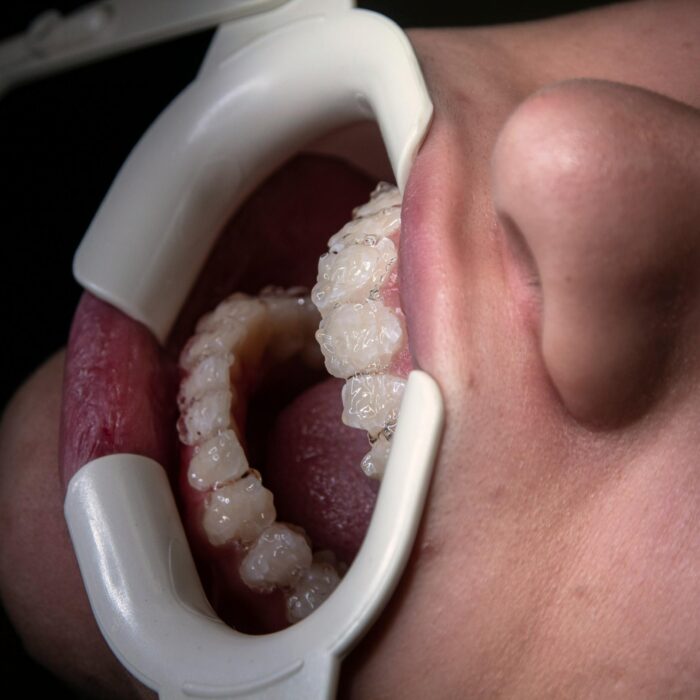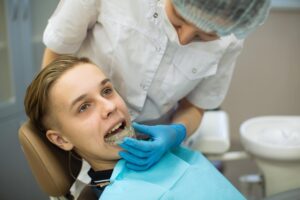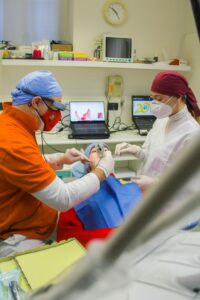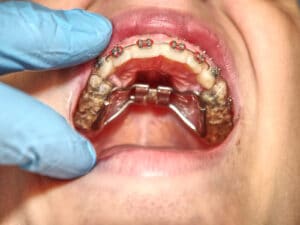Jaw surgery can bring significant changes to how a person speaks. When the jaw is misaligned, it can affect the way the tongue, lips, and teeth work together to form sounds. Many people experience issues with pronunciation, clarity, or airflow before surgery. After the procedure, speech may temporarily change as the mouth adjusts to its new structure.
Explore how jaw surgery speech changes before, during, and after the procedure. It will cover common speech challenges, the recovery process, and what to expect at each stage.
Before Jaw Surgery: How Speech Is Affected
Common Speech Issues That Lead to Jaw Surgery
People with jaw misalignment often experience difficulties with speech. The way the jaw moves impacts how sounds are formed. Some common issues include:
- Slurred or unclear speech – The tongue may not make proper contact with certain areas of the mouth.
- Lisping – A misaligned bite can affect how the tongue interacts with the teeth.
- Muffled pronunciation – Airflow may not be controlled well, leading to unclear words.
- Difficulty with specific sounds – Some letters, like “s” or “th,” may be harder to pronounce.
For some, these challenges affect daily communication. If speech problems are linked to jaw structure, surgery may help correct them.
How Jaw Structure Influences Speech Clarity
The position of the jaw plays a direct role in speech. A misaligned bite can limit how the tongue moves, making it harder to form certain sounds. Here’s how different jaw issues impact speech:
- Overbite – The upper teeth extend too far over the lower teeth, affecting sounds like “f” and “v.”
- Underbite – The lower jaw protrudes, which may cause difficulty with “s” and “z” sounds.
- Open bite – A gap between the upper and lower teeth makes it hard to pronounce words correctly.
These structural issues don’t just impact speech clarity. They can also make it harder to breathe properly while speaking, affecting volume and tone.
Speech Therapy Before Surgery: Is It Necessary?
Some patients work with a speech therapist before surgery. This can help improve pronunciation and strengthen muscles used for speaking. A therapist may focus on:
- Breath control exercises – Helps with volume and projection.
- Tongue placement techniques – Trains the tongue to form sounds correctly.
- Jaw relaxation methods – Reduces tension that affects speech.
While surgery corrects jaw structure, therapy can help make the adjustment process smoother. Some people also find that improving speech patterns before surgery helps them recover speech function more quickly afterward.
During Jaw Surgery: What Happens to Speech?
The Surgical Process and Its Immediate Effects
Jaw surgery involves repositioning the upper jaw, lower jaw, or both to improve alignment. Since this changes the structure of the mouth, speech is temporarily affected. Right after surgery, swelling, numbness, and restricted movement make speaking difficult. Some patients can only communicate using gestures, writing, or text-based methods for a short period.
The initial healing phase varies for each person, but most experience limited speech for at least a few weeks. As swelling decreases and mobility improves, speech starts to return.
Temporary Speech Challenges After Surgery
Speech is affected in several ways immediately after the procedure:
- Jaw wiring or banding – Some patients have their jaw secured shut for a short period, making speech nearly impossible.
- Swelling and numbness – The lips, tongue, and cheeks may be too swollen to form words properly.
- Increased saliva production – Speaking can be challenging when the mouth produces excess saliva, which is common after surgery.
- Changes in articulation – The way the tongue and lips move may feel unfamiliar, making certain sounds harder to pronounce.
Most of these challenges are temporary. As the jaw heals, speech clarity gradually improves.
Communication Methods While Recovering
Since speaking may not be possible right away, it helps to have alternative ways to communicate. Some useful methods include:
- Writing notes – Keeping a small notepad or using a notes app can help with communication.
- Text messaging – Sending texts to family or coworkers is often easier than trying to speak.
- Speech-to-text apps – Some apps allow users to type messages that are then spoken aloud.
- Practicing simple words – Once speech starts returning, beginning with easy, slow words can help regain clarity.
During this period, patience is important. Speech may not sound the same right away, but improvement happens gradually as healing continues.
After Jaw Surgery: The Speech Recovery Process
How Speech Gradually Improves
Speech does not return to normal immediately after jaw surgery. Recovery happens in stages, and each person heals at a different pace. In the first few weeks, swelling and stiffness make speaking difficult. Words may sound unclear, and certain sounds may feel harder to pronounce.
Over time, as jaw mobility increases, speech begins to improve. Most patients notice a significant difference within a few months. By this point, the tongue, lips, and jaw adjust to their new positions, allowing for clearer pronunciation.
The Role of Speech Therapy in Recovery
Some patients benefit from speech therapy after surgery. A speech therapist helps with exercises to regain clarity and control over speech patterns. These exercises may include:
- Tongue placement training – Helps adjust to the new jaw alignment.
- Pronunciation drills – Focuses on sounds that may be difficult after surgery.
- Breath control techniques – Improves airflow for better speech projection.
Therapy can speed up the adjustment process, especially for those who had significant speech challenges before surgery.
Common Speech Adjustments Patients Experience
As speech returns, some differences may be noticeable. Adjusting to a new jaw position takes time, and minor changes in pronunciation can occur. Some common adjustments include:
- Airflow control – The way air moves through the mouth may feel different, affecting certain sounds.
- Lip movement – If the jaw was significantly realigned, the lips may need time to adjust for speech.
- Sound articulation – Some letters, like “s” and “z,” may require more practice to pronounce clearly.
Most of these adjustments resolve within a few months. With time and practice, speech typically becomes clearer than it was before surgery.
FAQs About Jaw Surgery and Speech
How long does it take to speak normally after jaw surgery?
Speech recovery varies, but most patients notice improvement within a few weeks. Swelling and stiffness are common in the first month, making speech sound different or unclear. By three to six months, speech usually stabilizes. Full adjustment can take up to a year, depending on the extent of the surgery and individual healing speed.
Will my speech permanently change after the procedure?
For most people, speech returns to normal or improves after healing. If jaw misalignment caused speech issues before surgery, clarity might actually get better. However, minor pronunciation adjustments may be needed as the mouth adapts to its new structure.
Can speech therapy help me recover faster?
Yes, speech therapy can help regain clarity more quickly. A therapist provides exercises to strengthen muscles, adjust tongue placement, and improve articulation. Therapy is especially useful for patients who had difficulty speaking before surgery.
What are the biggest speech challenges after jaw surgery?
The most common difficulties include:
- Temporary slurred or muffled speech due to swelling.
- Trouble pronouncing certain sounds as the tongue and lips adjust.
- Increased saliva production, making speech feel different.
- Jaw stiffness limiting movement in the first few weeks.
These issues typically resolve with time and practice.
How can I prepare for speech changes before surgery?
Working with a speech therapist beforehand can help strengthen muscles and improve breath control. Practicing slow, clear speech may also make the adjustment easier after surgery. Some patients find it helpful to record themselves speaking before surgery to compare their progress during recovery.
Conclusion
Jaw surgery speech changes happen in stages, from temporary difficulties after the procedure to long-term improvements as the mouth adjusts. Before surgery, misalignment may cause speech challenges, and after surgery, swelling and stiffness can temporarily affect clarity. With time, most people regain normal speech, and some even notice improvements if jaw positioning was a problem before.
Recovery is different for everyone, but patience and practice make a difference. Speech therapy can help speed up the process for those who need extra guidance. If concerns about speech changes arise, discussing them with a surgeon or speech therapist can provide reassurance and a clearer recovery plan.
Take the Next Step Toward a Confident Smile
Jaw surgery can bring significant changes, including improvements in speech and overall oral function. If you have concerns about alignment, bite issues, or how orthodontic care fits into your treatment plan, professional guidance can make all the difference.
At Dr. Bob Bryan Orthodontics, we prioritize personalized care, using the latest advancements like Invisalign and digital scans to ensure the best possible results. Our team is committed to making your experience comfortable and effective, providing expert support every step of the way.
Schedule a consultation today and take the first step toward a healthier, more confident smile.







